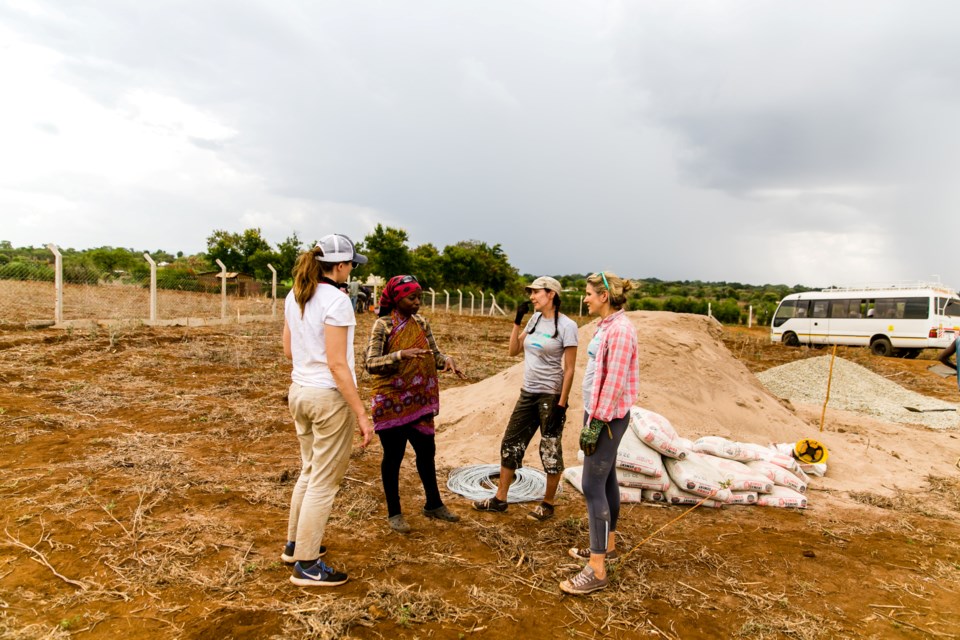Growing up in Whistler, immigration consultant Barbara Kolvekova got to see time and again the ways in which local women lift each other up in a sports town that has always leaned predominantly male in its makeup.
“I think we have a lot of awesome female empowerment and a lot of women helping women and building each other up. I definitely felt that,” she said. “I grew up here, so I was here as a child, as a teenager, and now as a woman going through my professional career, I feel and see a lot of that support. I think that’s unique and that plays into this as well. It’s very much a women-helping-women project that we’re trying to put on more of a global scale.”
Now, the 29-year-old is building on that legacy through a project she’s volunteering for to build a women’s shelter in the Tanzanian town of Arusha. She’s also committed to raising an additional $2,000 through a GoFundMe campaign (after meeting her initial target of $1,250) that will go directly towards labour and construction costs.
“I signed up, I volunteered, I booked a ticket and thought I should try to fundraise to create the biggest social impact possible,” Kolvekova said.
The Whistlerite was first connected to the project through WNorth, a business networking and support organization for mid-career women founded by another local, Heather Odendaal, and from there, began to learn more about the Tanzanian-based NGO, Dare Women’s Foundation, that is leading the project.
Founded in 2015 by Tanzanian native Maggie Duncan Simbeye, the NGO is dedicated to empowering Tanzanian women and girls, with a focus on rural areas, through poverty alleviation, economic empowerment, and gender equality, according to its website.
According to the World Bank, 44 per cent of Tanzanian women aged 15 to 49 have experienced either physical or sexual violence from an intimate partner. The prevalence of spousal violence is highest in rural areas, at 52 per cent, compared to urban areas, at 45 per cent. Nearly 30 per cent of Tanzanian girls, meanwhile, will experience sexual violence by the age of 18.
It’s an issue that’s been getting more attention of late in the East African nation, which recently adopted its National Plan of Action to End Violence Against Women and Children, although those efforts are lagging “due to lack of core oversight, weak institutional capacities, and limited infrastructure,” according to the World Bank.
Along with offering women fleeing gender-based violence a safe and supportive place to stay, the shelter is envisioned as “a place of empowerment,” said Kolvekova. “Women often remain in abusive relationships because they have nowhere to go or no means to support themselves economically.”
That means shelter staff will teach women skills in areas like agriculture and entrepreneurship that they can take back to their community and use to earn an independent income.
“I love that they have this idea of creating this program where the women have a chance to heal, but they are also going to be taught skills that they can bring back to their own community. It’s not a temporary Band-Aid fix,” Kolvekova added. “They want to actually empower them to earn their own income and then also bring that back to the community and hopefully create this really amazing domino effect.”
Once completed, the facility will be only the country’s second women’s shelter. Without a dedicated physical space, Simbeye, founder and director of the Dare Women’s Foundation, has resorted to taking women fleeing violence into her own home.
“She experienced the abuse from her partner worsening when COVID hit and filed for divorce,” Kolvekova explained. “She now takes in and supports women and children fleeing abuse in her own home. The shelter will help her expand what she is currently doing.”
To learn more about the foundation, visit darewomensfoundation.org.
To contribute to Kolvekova’s fundraising campaign, visit gofundme.com/f/building-tanzanias-womens-shelter.




